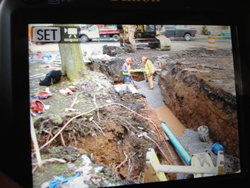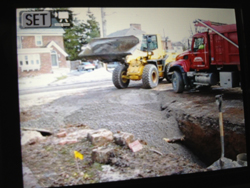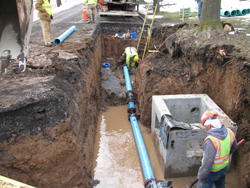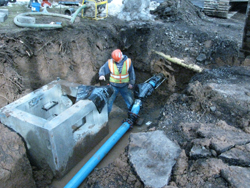Dyster May Dump Whislteblowing City Engineer
By Frank Parlato
As of press time, Niagara Falls City Engineer Jeffrey Skurka has not been fired, but sources say his dismissal is imminent.
The Niagara Falls Reporter has learned that Mayor Paul Dyster has ordered Skurka to stay away from two major road construction projects in the city: the Buffalo Avenue and Lewiston Road reconstruction projects.
Both contractors, CATCO Construction Co. and Accadia Site Contracting Inc. have reportedly informed the mayor that if Skurka continues to inspect the job sites on behalf of the city, they would turn in their bonds and walk off the job.
Skurka confirmed to the Reporter that Dyster has ordered him off the job sites.
In his defense, Skurka claims he was holding the contractors to the specifications in their contracts and insisting they follow safety procedures established by the U. S. Labor Department's Occupational Safety and Health Administration (OSHA), even if these resulted in additional costs.
The contractors claim they have had a longstanding problem with Skurka who, they say, does not understand the difference between methods and means of doing the work and the results achieved.
In an email to Skurka dated March 16, Accadia project manager Anthony Milone wrote as follows: "Since the beginning of the project you personally have continuously attempted to discredit Accadia's 'means and methods' in the completion of the work entailed on the Lewiston Road projec... (B)y doing so, you are attempting to discredit Accadia as a contractor. Accadia will not withstand any further slander from yourself or any other individual with regards to this matter."
For his part, Skurka called OSHA and a surprise inspection was made of the work site on March 7, the results of which are pending as of press time.
With Dyster siding with the contractors and taking Skurka off both jobs, the city's only licensed engineer is no longer inspecting the two largest ongoing projects in the city.
At the heart of the dispute are safety and whether the work is being done properly.
As for safety concerns, Skurka says that trenches dug to lay water and sewer lines were too deep to be safe without reinforcement, had water in the bottom and only one means of egress. All three of these are serious violations of OSHA regulations.
According to OSHA's website, "Trenches five feet deep or greater require a protective system unless the excavation is made entirely in stable rock."
The Lewiston Road trenches are not in stable rock but are a mixture of sandy silt and loose stone, soil reports indicate.
Skurka said that OSHA inspector, Michael Willoughby, determined that Accadia was in violation and Skurka believes fines will be levied against Accadia.
"I was there when OSHA made the inspection and from what I am told by the inspector, OSHA will cite Accadia for 'serious violations,' and 'willful violations,’" Skurka said. "If they have an accident after a hearing and a finding of 'willful' neglect, it will go directly to the Department of Justice."
According to OSHA guidelines, a "willful violation is one committed with an intentional disregard for, or plain indifference to, the requirements of the OSHA act and regulations. A serious violation is defined as a condition which exists where there is a substantial possibility that death or serious physical harm can result."
Paul Marinaccio, president of Accadia Site Contracting, Inc., said his trenches were not more than five feet deep and that they did not need reinforcement.
"Skurka is crazy," he said, "He doesn’t know a damn thing about engineering. Skurka did not measure the trenches. I did. They were five feet deep."
When asked what if OSHA finds otherwise, Marinaccio said, "If OSHA fines me, I will fight them. I have not had OSHA on one of my jobs in 25 years and I have never had an accident, ever. I believe in safety. Nobody ever got injured on one of my jobs, ever. I have never had a man injured on one of my jobs."
Photographs of the site show that, unless Marinaccio's workers are less than four feet tall in height, the trenches are more than five feet in depth and that workers are standing in trenches with standing water, and with only one means of egress.
Back in 1999, Skurka was employed as a field engineer for the Brick Township Municipal Utilities Authority, inspecting the installation of three miles of water line.
Skurka told anyone and everyone, court records reveal, that the contractor, Utility System Inc., was digging trenches deeper than five feet without reinforcing them.
Skurka said he knew that the sugar sand in the trenches had little stability. The contractor told him it was nonsense. At one point, Skurka actually ordered the men out of the hole. His superiors told him that he could not stop the project and the men were ordered back into the trench. The fight went on for weeks. Skurka repeatedly ordered men out of the trenches, defying the contractor. At one point the contractors threatened him physically. Skurka threatened to call the police.
The investigation and lawsuits that later emerged revealed that Skurka was told that if he called OSHA he would be fired. One witness, Skurka's immediate supervisor, Michael Thulen, said that Skurka pleaded with him, saying that he did not want to have to explain to someone's widow and children that someone had died there because of unsafe trenches.
Despite Skurka's repeated entreaties, he was ignored until, on April 29, 1999, Arsenio Neves, 43, of Newark was killed when one of the trenches partially collapsed on him and he struck his head on a water main pipe being installed at the site.
OSHA cited Utility System, Inc. of Colonia, N. J., with "gross negligence" for willful and serious violations of OSHA standards and fined them $81,000, plus a stipulation that they pleaded guilty.
Skurka said his refusal to lie to OSHA inspectors, who came the next day to investigate the death, led to his being fired a year later. Skurka sued for wrongful termination and won an award of $370,000 and vindication that he was right.
Skurka says the same risk is present in the trenches being used on Lewiston Road.
The other dispute between Skurka and CATCO and Accadia is the embedding of water and sewer pipes.
Skurka objected to the way the pipes were embedded- without a level base of compacted stone beneath the pipes - but rather the pipe was laid on two bricks and then the company dumped the stone underneath the pipe, making compaction difficult if not impossible.
The pictures show that pipes do not have a solid base of stone underneath them and that in the case of gas pipes no stone underneath at all before backfilling.
Skurka says the result will be settling, pot holes and broken water lines, and claims that two new water lines have already broken on Lewiston Road.
In geotechnical engineering, soil compaction is the process in which a stress applied to a soil causes densification as air is displaced from the pores between the soil grains.
"If they did it in six inch lifts, as they are supposed to do, they will get proper compaction. It will take them a long time to do it right and much more money," said Skurka.
Marinaccio told the Reporter that Skurka "does not know anything about road construction. He's an idiot."
Milone said that a compaction test was made by an independent expert that showed Accadia's method of compaction was appropriate and exceeded the minimum 95 percent compaction required.
SJB Services Inc., of Hamburg, performed compaction tests on some of the backfilled excavations, according to records obtained by the Reporter.
According to Milone, Marinaccio, and Wendel Engineering's Clifford Ellwood, the select backfill in question passed the compaction test.
But Skurka said the test was done wrong, and went so far as to accuse Accadia of rigging the test. He said Accadia "put the ram hole in the hole and then compacted the soil before they did the test, which would guarantee them test results that would show the soil was compacted regardless of whether it was really compacted or not."
Pointing out that Milone of Accadia is a licensed engineer and suggesting that Wendel, already under fire for delays in the project, may have conspired to make sure the test passed, Skurka said, "If I go to the board of professional engineers, I will make my complaint against not only Tony Milone of Accadia but against Wendel Engineers also.
"It's pretty clear there is collusion. There is a lot of money at stake here."
Then why did the mayor not back you?
"I don't know. Maybe he did not want the embarrassment of another walk off on the Lewiston Road job," Skurka said. "One thing I don't do is let a contractor lie to me and when they do, I call them on it. I plan to file a complaint with the board of professional engineers. I'm doing this for the city and myself. I have a professional obligation to the City of Niagara Falls."
Marinaccio said this all is nonsense.
"Put a camera through my pipe,” said Marinaccio. "If it has any deflection (crooked pipes), I will dig up every inch of that pipe at my own expense and redo the whole job. But if there is no deflection, then I want Skurka, not the taxpayers, to pay for the dig. I've been doing roads for 40 years. If anything happens on this job, I will go back and redo it out of my own pocket."
"Accadia is a company that has been in business for over 40 years with individuals that have over 60 years of combined experience," Milone wrote." There are not many other companies in the area that are able to provide the same statement. A company of such longevity does not occur by a mere fluke. Accadia strives to provide each and every project owner with the best end product possible."
Referring to Skurka, Milone added, "In my 25 years and Paul Marinaccio's nearly 45 years of experience in the construction industry we have never been exposed to such tactics by an individual."
Pointing out pictures of the excavations, Skurka rebuts by showing that water and gas lines have no stone underneath and are held up by bricks or nothing at all. Then, as the photos show, they are backfilled with stone.
Skurka said, "You cannot compact what is below the pipes. The stone below should be put on grade and compacted first. Of course, to do that is a much more expensive process."
The removal of Skurka does not solve the entire problem for the notoriously contractor-friendly Dyster. If Skurka, as city engineer, doesn't sign off for progress payments, the city cannot get state and federal reimbursements and the contractor cannot be paid, unless, of course, the mayor directs somebody else to sign it.
Skurka says he will not sign, regardless of whether the mayor orders him to do so or fires him for not signing it.
A month ago, Skurka met with Councilmen Sam Fruscione and Glenn Choolokian. Choolokian said he told Skurka that he noticed that there was "change order after change order" on all Dyster projects.
"The Dyster administration has a reputation of having change orders and the contractors know they can get away with change orders," Choolokian said. "Skurka is doing a good job and is monitoring everything. But I hear that Dyster said 'at all costs, get the Lewiston road done.'"
Choolokian pointed out that Skurka questioned the hiring of a contractor that Dyster wants to hire to repair the ice rinks at the Ice Pavilion.
Skurka recommended a different contractor.
"We heard Dyster went nuts about it," Choolokian said "and is trying to rush the other company. We hear rumors that Skurka might be fired any day now. It is funny how they do business. Dyster hired Skurka and believed in his ability and now all of sudden he doesn't believe in his abilities."
There may be another good reason to fire Skurka, from Dyster's point of view.
With the train station bid specifications being assembled now by Wendell, Dyster knows that an over-active Skurka, who will question train station specs, may stifle change orders and other pro-consultant and contractor opportunities.
As readers may recall, Dyster fired City Engineer Bob Curtis as the courthouse project broke ground, replacing him with Ali Marzban, who was unlicensed to practice engineering anywhere in the United States.
History may be about to repeat itself, and the health and safety of a lot of people here in Niagara Falls is at stake.



